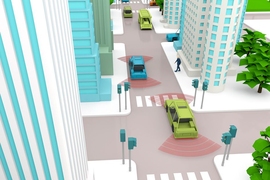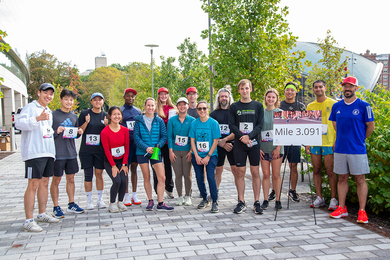Students from the MIT Driverless team, together with students from Delft University of Technology (TU Delft), placed third overall — in a field of 20 university competitors — in the Driverless category at the 2019 Formula Student Germany (FSG) competition in Hockenheim, Germany. Winning teams were scored not solely on speed, but also by their overall construction, performance, and financial planning. The intercontinental MIT-TU Delft team placed first in Cost and Manufacturing, second for Business Concept, and third for Engineering Design and Presentation.
One of the largest student engineering competitions in the world, FSG takes place at the Hockenheimring Track. Close to 3,500 students from 26 nations participated in the 2019 FSG.
The team’s third-place finish comes at the heels of their second-place finish in the Driverless category at Formula Student Italy (FSI), competing with more than 2,600 students among 86 teams.
The MIT Driverless team, made up of 25 undergraduate and graduate students across six disciplines, has the distinction of being the Institute’s first student-led autonomous Formula race car team.
MIT Driverless, operating under the auspices of the Edgerton Center, partnered with the Delft Driverless team in Delft, Netherlands, early in summer 2018. Over the past year, the teams worked together to modify TU Delft’s electric race car, building the software to operate the car autonomously.
“Connecting the world-class electric vehicle from Delft with breakthrough robotics research at MIT was a logical choice,“ says team captain Luke Kulik, a graduate student in aeronautics and astronautics. “It simply had to be done, despite all the logistical challenges.” To stay connected, the teams had multiple standing conference calls each week, as well as three major integration trips in January, March, and June, when the MIT team traveled to Delft.
The MIT Driverless team undertook all facets of autonomous vehicle technology, teaching the race car how to perceive and interpret its environment, and then plan its path despite uncertainties and errors. A key difficulty, especially for a team in two different locations, was making sure all subsystems worked together seamlessly and that the assumptions made throughout the year were reasonable.
“A million small things needed to come together for the car to run — that’s why it was so satisfying to see the vehicle zip through the track at FSG,” says Kathleen Brandes '19, the team’s chief of path planning and controls during the competition. At FSG, the team’s top speed was 41 kilometers per hour in the acceleration event, and their average lap time was 78 seconds in the main Trackdrive event.
“This is an impressive accomplishment, also considering the team developed a complete working solution in less than one year, and the long-distance nature of the collaboration with the Delft team,” says the team’s faculty advisor, Luca Carlone, assistant professor of aeronautics and astronautics. “It has been very exciting to interact with such a talented and dedicated team of students and was terrific to see this great result from Luke and his team.”
The team is looking forward to carrying the momentum from their first year of competing to the 2019-20 season. Sponsors include Magna, Waymo, Samsung, and the Edgerton Center.












